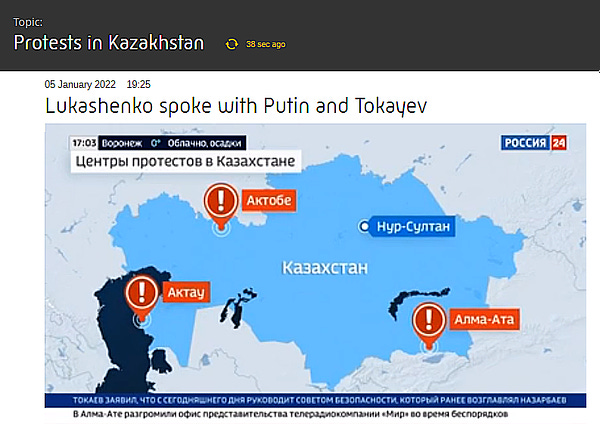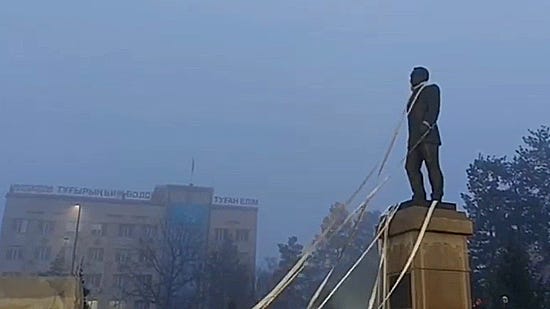Today, clashes between anti-government protesters and state forces in Kazakhstan have forced Central Asia into an unexpected crisis. Kazakhstan has about 19 million people and is the ninth largest country in the world. After years of smaller protests, this week's protests began on January 2, sparked by a rise in fuel prices, but spread rapidly across the oil-rich country, where an authoritarian government has enriched cronies, ignored the economic needs of the people, and rigged elections so that only pro-government candidates can win. The country's president, Kassym-Jomart Tokayev, has dismissed his government, declared a state of emergency, and vowed to "act as tough as possible." It appears he also shut down the internet, making it difficult to know exactly what is going on in the country. Still, it appears that as protesters took control of a key airport and government offices, set fire to the presidential palace, and pulled down statues of regime leaders, some security forces joined them, while others loyal to the president shot protesters. Members of the country's wealthy political class who could, appear to have fled the country in private jets before protesters took over the airport. Russia analyst Julia Davis reported that the uprising against corruption and kleptocracy in Kazakhstan has worried Russian president Vladimir Putin and Belarus president Alexander Lukashenko, both of whom spoke to Tokayev today. By the end of the day, Tokayev had asked for help from security forces of the Collective Security Treaty Organization (CSTO), a military alliance of some of the former Soviet states, in putting down what he called "a terrorist threat" from outside agitators. Of those states, Russia and Belarus are the two with the most military power, but Russia currently is holding troops in Belarus on the border of Ukraine and so has less flexibility than normal, especially if the protests spread to Belarus. Still, the CSTO allies, led by Russia, have agreed to send a "peacekeeping force" to Kazakhstan to stop "outside interference." Peter Spiegel of Financial Times notes that Putin likely fears the protests are a warning that citizens will not tolerate autocracies forever. The U.S. says it is watching the situation and has called for authorities and protesters to exercise restraint and to "respect and defend constitutional institutions, human rights, and media freedom," while searching for "a peaceful resolution." So, we are watching people in Kazakhstan try to recover the right to have a say in their own government on the anniversary of the day that Americans came perilously close to losing that right. A year ago, forces marshaled by then-president Donald Trump tried to overturn the legitimate results of an election and install Trump against the will of the majority. They failed on that day, but their efforts have not stopped. In the past year, 19 Republican-dominated states have reworked their election systems to suppress Democratic voting and to give control of election results to partisan Republicans. They have purged from office election officials who refused to overturn the election results, and NPR's Miles Parks reported today that Republicans who continue to deny that Biden won the 2020 election—against all evidence—are running to become their state's top election officials in at least 15 states in 2022. Today, former president Jimmy Carter, who co-founded the Carter Center with his wife Rosalynn to promote democracy and human rights, published an op-ed in the New York Times titled: "I Fear for Our Democracy." "I have… seen how…democratic systems…can fall to military juntas or power-hungry despots," he wrote. He urged Americans to respect free and fair elections, refuse violence, pass election reforms that would make it easier to vote, and ignore disinformation. "Our great nation now teeters on the brink of a widening abyss," he wrote. "Without immediate action, we are at genuine risk of civil conflict and losing our precious democracy." Today, Attorney General Merrick Garland spoke about the first anniversary of the attack on the Capitol. He reassured those frustrated that prosecutors have so far charged only the rioters themselves, while those who planned and then incited the insurrection still walk free. Garland explained that large investigations always begin with the smaller, easier cases while the department builds a timeline and gathers evidence. He promised that the Justice Department will follow the facts and that it will hold "all January 6th perpetrators, at any level, accountable under law—whether they were present that day or were otherwise criminally responsible for the assault on our democracy." He called attention to the fact that the Department of Justice has issued more than 5,000 subpoenas and search warrants, seized around 2,000 devices, watched more than 20,000 hours of video, and searched through 15 terabytes of data. It has arrested and charged more than 725 defendants. And then he gave an eloquent defense of democracy and the voting rights on which it depends. After all, Congress established the Department of Justice in 1870 to protect the civil rights promised in the 13th, 14th, and 15th Amendments by protecting the right of Black Americans to vote and so have a say in their government. Those who wrote the Reconstruction Amendments believed that voting was central to the concept of self-government, a belief Congress reinforced in 1965 with the Voting Rights Act that gave the Department of Justice new tools to protect the right to vote. But in the 2013 Shelby County v. Holder case, the Supreme Court gutted that law. Immediately, states began to pass laws to restrict voting. Lately, that push has gotten even stronger. Garland promised that the Justice Department will continue to do all it can with the powers it has, but he called it "essential" for Congress to give the department the power it needs to guarantee that "every eligible voter can cast a vote that counts." What is at stake today in America is the nature of our government. Will we accept an authoritarian government like that currently under attack in Kazakhstan, in which an autocratic leader funnels money to his cronies while ordinary people struggle, unable to fix the system that is rigged against them until finally they lay down their lives to change it? Or will we restore the principles on which the Founders based this nation: "that all men are created equal" and that governments derive "their just powers from the consent of the governed..."? — Notes: https://www.state.gov/kazakhstan-state-of-emergency/ https://www.rferl.org/a/kazakhstan-protests-analysis-poverty-corruption/31641045.html  Dr. Diana T. Kudaibergenova @CreativeCorazon Dr. Diana T. Kudaibergenova @CreativeCorazonJanuary 5th 2022 33 Retweets116 Likes Togzhan Kassenova @tkassenova Togzhan Kassenova @tkassenovaJanuary 5th 2022 336 Retweets1,007 Likes Julia Davis @JuliaDavisNews Julia Davis @JuliaDavisNews January 5th 2022 280 Retweets904 Likeshttps://eurasianet.org/kazakhstan-demonstrators-gain-upper-hand-in-increasingly-turbulent-unrest https://www.washingtonpost.com/world/2022/01/06/kazakhstan-nazarbayev-protest/  Julia Davis @JuliaDavisNews Julia Davis @JuliaDavisNews January 5th 2022 233 Retweets612 Likeshttps://news.yahoo.com/kazakhstan-declares-emergencies-cities-hit-201830906.html https://www.ft.com/content/aab644cd-f8e9-4351-9147-c699eae1e896 https://www.nytimes.com/2022/01/05/opinion/jan-6-jimmy-carter.html |
Juan

No comments:
Post a Comment